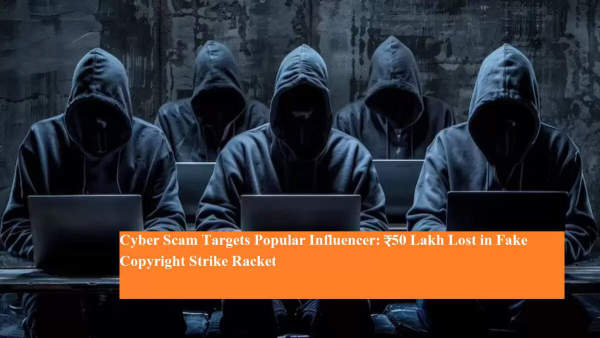
A shocking case of online fraud has emerged from Jabalpur, where a well-known Instagram influencer, Azeem Ahmad, was duped of ₹50 lakh by cybercriminals. The fraudsters allegedly threatened to impose fake copyright strikes and ban his accounts, forcing him to pay huge sums to prevent it. The Jabalpur Cyber Cell has now launched an investigation into the case and reached out to Instagram’s internal team for assistance.
According to officials, this appears to be part of a new cybercrime trend where scammers exploit content creators’ fear of losing their social media accounts — a stark reminder for influencers and digital entrepreneurs to stay alert.
As per reports, the fraudsters contacted Azeem Ahmad pretending to represent Instagram’s moderation team. They warned him that multiple copyright complaints had been filed against his content and that his pages would soon be deleted unless he paid them to “settle” the issue.
Fearing account suspension, Ahmad allegedly transferred around ₹50 lakh in several installments. The scammers used fake documents and emails that looked identical to official Instagram communication, making it nearly impossible to distinguish them from legitimate notices.
This marks Jabalpur’s first major cyberblackmail case involving fake digital copyright claims — a sophisticated scam that leverages influencers’ dependency on online platforms for livelihood and reputation.
28-year-old Azeem Ahmad, a Jabalpur-based software engineer turned digital influencer, has built an enormous social media empire. Starting his journey in 2017 with a single Instagram page, his content gained massive traction during the 2021 COVID-19 lockdown.
Today, Ahmad manages 96 Instagram pages with a combined following of over 57 million users — making him one of India’s most followed independent content creators. His brand collaborations and digital campaigns have earned him a strong reputation in the influencer community.
Ahmad revealed that he had been receiving fake copyright warnings and threatening messages for nearly a year. The imposters introduced themselves as “mediators” who could remove copyright strikes for a fee.
“In one instance, a caller from Pune demanded ₹25,000 to ₹30,000, claiming he could lift the strike immediately,” Ahmad told police investigators. Initially, he ignored the messages, but as the frequency and intensity of the threats increased — coupled with the risk of account bans — he gave in to the extortion.
Jabalpur Cyber Cell in-charge Neeraj Negi confirmed that this is the first case in the city involving blackmail through fake content strikes. Negi noted that cybercriminals are now exploiting the automated systems of social media platforms to manipulate creators and demand money under false pretenses.
The department is working to trace the money trail and identify the individuals behind the racket. Investigators believe that the group may have targeted several other Indian influencers using similar tactics.
The Cyber Cell has sought technical assistance from Instagram’s internal security team to determine how these counterfeit copyright warnings were generated and how the scammers gained access to the influencer’s contact information.
Authorities are also analyzing digital footprints, payment records, and email headers to track the origin of the scam network. Officials have urged all digital creators to verify any copyright-related communication directly through the official Instagram app or Meta support channels, and to avoid sharing personal or financial details over phone or email.
Experts warn that as India’s creator economy grows, scams targeting influencers are likely to become more sophisticated. Fake copyright strikes, clone pages, and impersonation frauds are increasingly common, exploiting the creators’ reliance on platforms for revenue and visibility.
This incident serves as a wake-up call for all social media professionals to strengthen cybersecurity awareness, enable two-factor authentication, and treat any unofficial requests for money with suspicion.